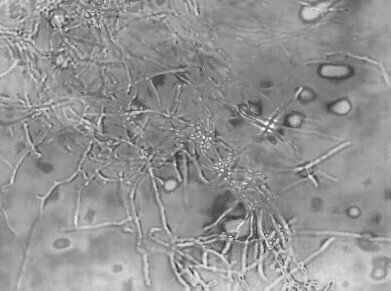-
 Streptomyces sp. from the Nottingham Sustainable Process Technologies Research Group collection (the magnification is 400)
Streptomyces sp. from the Nottingham Sustainable Process Technologies Research Group collection (the magnification is 400)
News & Views
Researchers on Discovery Trail for first Covid-19 Antiviral Drug
Jul 22 2020
In collaboration with biotech firm Cyanetics and Public Health England (PHE), molecular microbiologists at the University of Nottingham are investigating the harmless bacteria Streptomyces – found in abundance in the soil – aiming to find a specific strain that can effectively target SARS-CoV-2. Importantly, this microbe has the ability to produce natural compounds (secondary metabolites) and exhibits antimicrobial and valuable antiviral properties.
In the first phase of this Innovate UK-funded project, scientists from Cyanetics will be using their laboratories in Stevenage to test over 100 Streptomyces species from a unique collection held by the Sustainable Processing Group (SPT) at the University of Nottingham.
Assistant Professor in White Biotechnology, Dr Samantha Bryan, custodian of the Streptomyces strains in question, will lead a team of SPT researchers to support Cyanetics on the preliminary laboratory investigations in response to COVID-19.
Dr Bryan, who is based in the Faculty of Engineering, said, “There is an urgent need to discover new and effective antivirals against SARS-CoV-2. Therefore, given the plethora of secondary metabolites that Streptomyces produce, they're an untapped resource for new antiviral medications. Large-scale screening, such as the one we are undertaking, increases the likelihood of identifying such antivirals.”
In phase two of the six-month project, researchers will send a shortlist of some 40 viable compounds that may inhibit in vitro replication of the SARS-CoV-2 virus in cell culture to PHE scientists for further testing towards drug development.
Founding scientist and CEO of Cyanetics, Daniel Read, said, “Governments worldwide are engaged in new prevention technologies such as vaccines and testing. However, in order to effectively manage this crisis, we require pharmaceutical solutions which both prevent and treat viral infections.
“Armed with candidate compounds showing activity against SARS-CoV-2, we will have a brand new and promising commercial opportunity, presenting highly attractive opportunities for additional funding and investment. A follow-on project would look at efficacy, toxicology and scale-up of candidates.”
For this project, entitled ‘Discovering Anti-Viral Treatments for COVID-19 Infections’, £50,000 in Innovate UK funding was awarded to Cyanetics through the Business-led innovation in response to global disruption (de minimis) competition in order to deliver the initial research. This has potential to form the basis for a joint venture on delivery of promising candidates.
The University of Nottingham has secured over £2m of Innovate UK funding to date for projects to help in the fight against the novel coronavirus.
Digital Edition
Lab Asia 31.2 April 2024
April 2024
In This Edition Chromatography Articles - Approaches to troubleshooting an SPE method for the analysis of oligonucleotides (pt i) - High-precision liquid flow processes demand full fluidic c...
View all digital editions
Events
Apr 28 2024 Montreal, Quebec, Canada
May 05 2024 Seville, Spain
InformEx Zone at CPhl North America
May 07 2024 Pennsylvania, PA, USA
May 14 2024 Oklahoma City, OK, USA
May 15 2024 Birmingham, UK

















